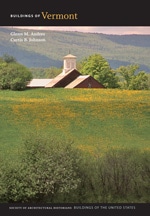
This two-and-a-half-story, gable-roofed, stone building in this remote upland village is significant for its association with Lewis Robinson, one of the first major map publishers in the United States. It is also an important example of snecked-ashlar construction popular in the upper Black and Williams rivers region during the 1830s and 1840s. Robinson, whose father settled in Reading in the 1780s, began publishing maps in Akron, Ohio, in 1825. He returned to Reading in 1839 and opened the South Reading Farmers' Store cooperative in this building. In addition to the store, he printed maps, business and legal forms, and ephemera in another portion of the building and an attached wooden ell (no longer extant). The building, perhaps constructed before Robinson acquired it, is a rare example of a once-common vernacular form, a combined house/store, with a three-bay storefront and a four-bay house under one roof. Its survival is likely due to its stone construction, thought to be the work of Reading mason Clark Wardner. It is not clear whether Wardner worked with Scottish masons on the 1832 mill in nearby Cavendish that brought snecked-ashlar masonry to the region or otherwise adopted the technique. The schoolhouse (1834) he built in Cavendish and the house of Ptolemy Edson in North Chester are the earliest extant snecked-ashlar buildings known in Vermont.














